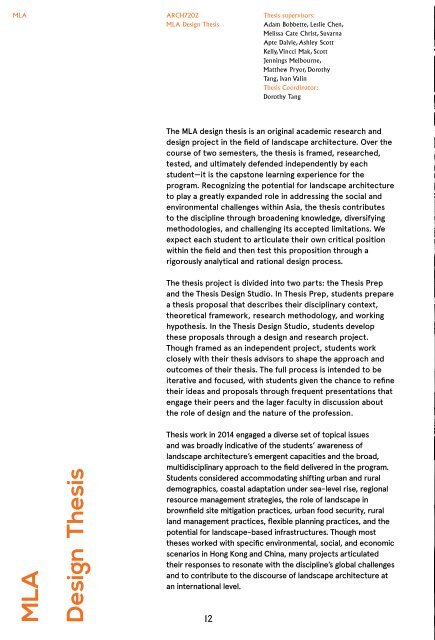HKU-Landscape-Annual-2013-14
HKU-Landscape-Annual-2013-14
HKU-Landscape-Annual-2013-14
Create successful ePaper yourself
Turn your PDF publications into a flip-book with our unique Google optimized e-Paper software.
MLA<br />
ARCH7202<br />
MLA Design Thesis<br />
Thesis supervisors:<br />
Adam Bobbette, Leslie Chen,<br />
Melissa Cate Christ, Suvarna<br />
Apte Dalvie, Ashley Scott<br />
Kelly, Vincci Mak, Scott<br />
Jennings Melbourne,<br />
Matthew Pryor, Dorothy<br />
Tang, Ivan Valin<br />
Thesis Coordinator:<br />
Dorothy Tang<br />
MLA<br />
Design Thesis<br />
The MLA design thesis is an original academic research and<br />
design project in the field of landscape architecture. Over the<br />
course of two semesters, the thesis is framed, researched,<br />
tested, and ultimately defended independently by each<br />
student—it is the capstone learning experience for the<br />
program. Recognizing the potential for landscape architecture<br />
to play a greatly expanded role in addressing the social and<br />
environmental challenges within Asia, the thesis contributes<br />
to the discipline through broadening knowledge, diversifying<br />
methodologies, and challenging its accepted limitations. We<br />
expect each student to articulate their own critical position<br />
within the field and then test this proposition through a<br />
rigorously analytical and rational design process.<br />
MLA<br />
Design Thesis<br />
The thesis project is divided into two parts: the Thesis Prep<br />
and the Thesis Design Studio. In Thesis Prep, students prepare<br />
a thesis proposal that describes their disciplinary context,<br />
theoretical framework, research methodology, and working<br />
hypothesis. In the Thesis Design Studio, students develop<br />
these proposals through a design and research project.<br />
Though framed as an independent project, students work<br />
closely with their thesis advisors to shape the approach and<br />
outcomes of their thesis. The full process is intended to be<br />
iterative and focused, with students given the chance to refine<br />
their ideas and proposals through frequent presentations that<br />
engage their peers and the lager faculty in discussion about<br />
the role of design and the nature of the profession.<br />
Thesis work in 20<strong>14</strong> engaged a diverse set of topical issues<br />
and was broadly indicative of the students’ awareness of<br />
landscape architecture’s emergent capacities and the broad,<br />
multidisciplinary approach to the field delivered in the program.<br />
Students considered accommodating shifting urban and rural<br />
demographics, coastal adaptation under sea-level rise, regional<br />
resource management strategies, the role of landscape in<br />
brownfield site mitigation practices, urban food security, rural<br />
land management practices, flexible planning practices, and the<br />
potential for landscape-based infrastructures. Though most<br />
theses worked with specific environmental, social, and economic<br />
scenarios in Hong Kong and China, many projects articulated<br />
their responses to resonate with the discipline’s global challenges<br />
and to contribute to the discourse of landscape architecture at<br />
an international level.<br />
12 13


